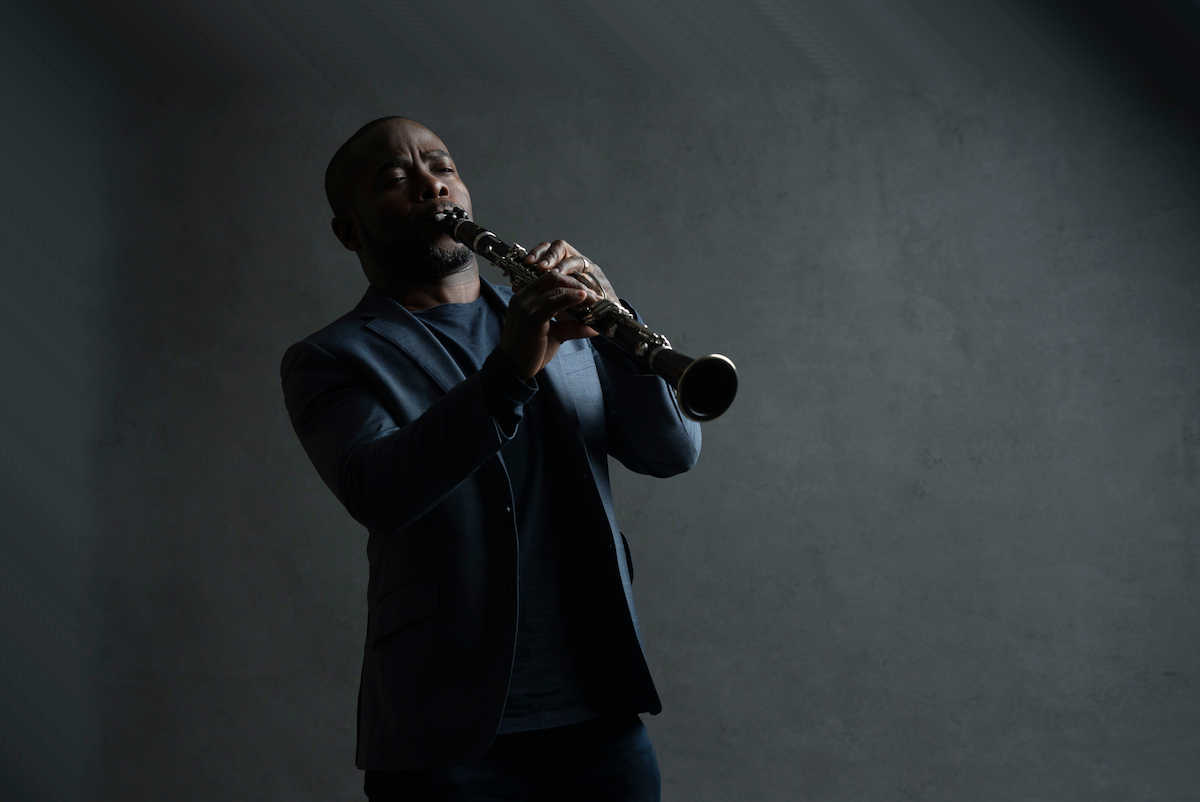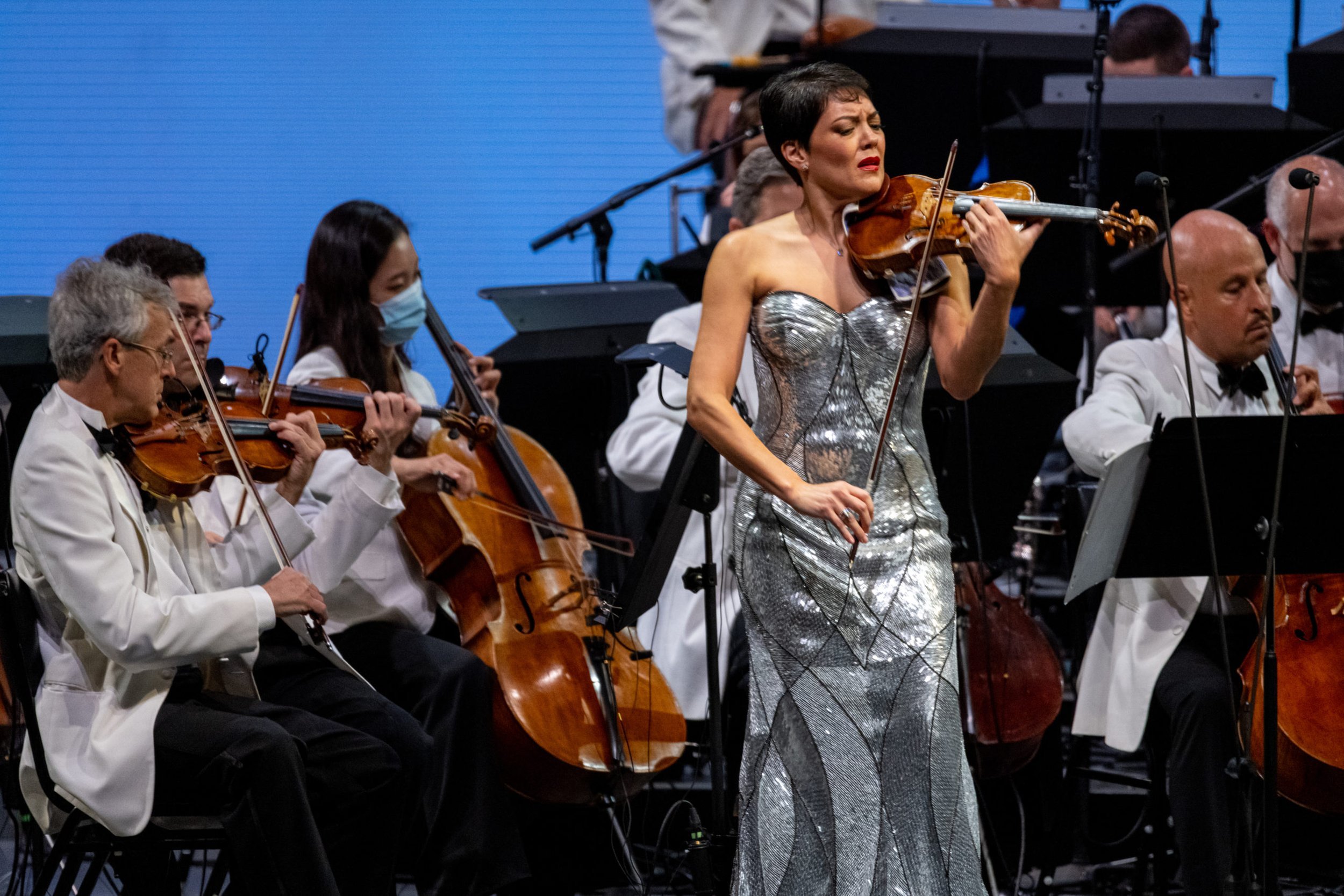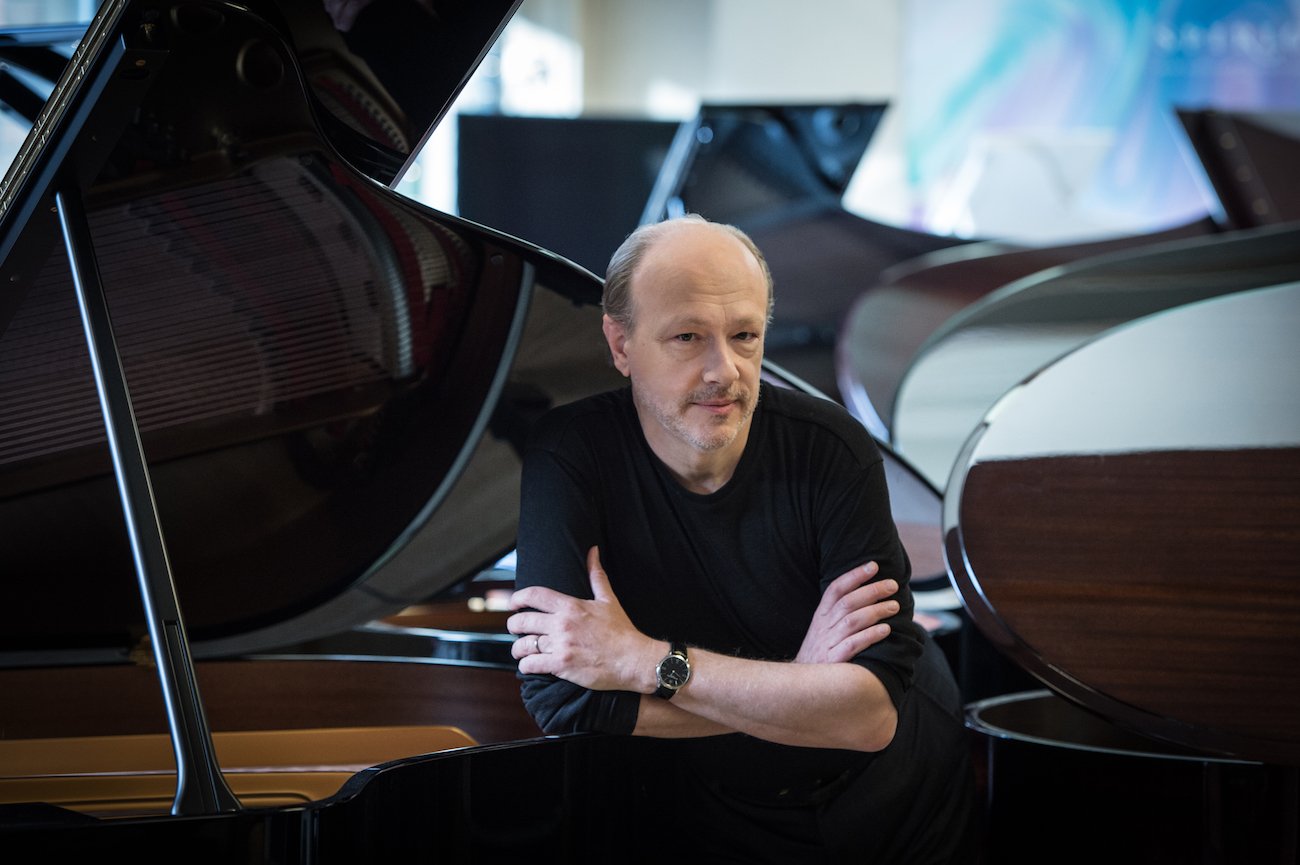A Starry Night of Contemporary Composition Under the LA Phil’s Green Umbrella
Here in a nutshell is what went on under the Green Umbrella at Walt Disney Concert Hall on Tuesday night, April 16.
There were no less than five world premieres, four of which kicked off a promising project, LA Phil Etudes, along with a fifth by Canadian-born composer Zosha Di Castri. Anthony Davis, famed for his operas X: The Life and Times of Malcolm X and The Central Park Five, was present to take in his terrific jazz-drenched clarinet concerto, You Have the Right to Remain Silent. LA Phil Creative Chair John Adams conducted.
It all went more than well. This was a consistently stimulating evening of new music, sometimes in surprising ways.
SAN FRANCISCO CLASSICAL VOICE
By Richard S. Ginell
Here in a nutshell is what went on under the Green Umbrella at Walt Disney Concert Hall on Tuesday night, April 16.
There were no less than five world premieres, four of which kicked off a promising project, LA Phil Etudes, along with a fifth by Canadian-born composer Zosha Di Castri. Anthony Davis, famed for his operas X: The Life and Times of Malcolm X and The Central Park Five, was present to take in his terrific jazz-drenched clarinet concerto, You Have the Right to Remain Silent. LA Phil Creative Chair John Adams conducted.
It all went more than well. This was a consistently stimulating evening of new music, sometimes in surprising ways.
San Francisco Classical Voice: Violinist Anne Akiko Meyers Takes Music Into Her Own Hands
Already a seasoned performer at age 11, when she made her debut with the Los Angeles Philharmonic and appeared on The Tonight Show with Johnny Carson, violinist Anne Akiko Meyers, now 53, is still riding high. A champion of contemporary composers, she has also collaborated with today’s most celebrated conductors, orchestras, and presenters.
Next weekend, Feb. 16–18, Meyers takes the reins of the Laguna Beach Music Festival as this year’s artistic director, performing in three programs, the first of which features works by Arvo Pärt and Heitor Villa-Lobos, as well as a world premiere by Philip Glass. Hailed as “the Wonder Woman of commissioning” by The Strad magazine, the violinist was recently nominated for a Grammy Award for her live recording with Gustavo Dudamel and the LA Phil of Arturo Márquez’s concerto Fandango, written for her in 2021.
Born in San Diego, Meyers began violin lessons with Alice and Eleonore Schoenfeld at the Community School of Performing Arts (now the Colburn School) before moving to New York at age 14 to study at The Juilliard School with the legendary teacher Dorothy DeLay. Just four years later, Meyers recorded her debut album, which featured concertos by Samuel Barber and Max Bruch, with the Royal Philharmonic Orchestra (RPO) at Abbey Road Studios.
San Francisco Classical Voice
By Victoria Looseleaf
Already a seasoned performer at age 11, when she made her debut with the Los Angeles Philharmonic and appeared on The Tonight Show with Johnny Carson, violinist Anne Akiko Meyers, now 53, is still riding high. A champion of contemporary composers, she has also collaborated with today’s most celebrated conductors, orchestras, and presenters.
Next weekend, Feb. 16–18, Meyers takes the reins of the Laguna Beach Music Festival as this year’s artistic director, performing in three programs, the first of which features works by Arvo Pärt and Heitor Villa-Lobos, as well as a world premiere by Philip Glass. Hailed as “the Wonder Woman of commissioning” by The Strad magazine, the violinist was recently nominated for a Grammy Award for her live recording with Gustavo Dudamel and the LA Phil of Arturo Márquez’s concerto Fandango, written for her in 2021.
Born in San Diego, Meyers began violin lessons with Alice and Eleonore Schoenfeld at the Community School of Performing Arts (now the Colburn School) before moving to New York at age 14 to study at The Juilliard School with the legendary teacher Dorothy DeLay. Just four years later, Meyers recorded her debut album, which featured concertos by Samuel Barber and Max Bruch, with the Royal Philharmonic Orchestra (RPO) at Abbey Road Studios.
Read more here.
San Francisco Classical Voice: Anthony McGill Graces Oakland Symphony With Anthony Davis Concerto
The Oakland Symphony has never let its under-$3-million budget cramp its thinking. It’s still an orchestra on a social equity mission, which you could see from the highly diverse audience at Friday night’s concert at the Paramount Theatre and from the title of the concert itself: “Truth to Power.”
Since the orchestra is still in search mode for a new music director, critical eyes were cast upon the evening’s conductor, Jeri Lynne Johnson. She has an impressive resume, giving well-received guest appearances, founding the Black Pearl Chamber Orchestra, and winning the Taki Alsop Conducting Fellowship in 2005. She’s a direct presence on the podium, all business and no extra movements. She had the orchestra’s attention, leading a crisp reading of Beethoven’s Fidelio Overture to start. And she was more impressive leading Anthony Davis’s clarinet concerto You Have the Right to Remain Silent. I’d give her high marks for her conducting work.
You might not expect a high-powered soloist like Anthony McGill — 2024 Grammy nominee, a performer at former President Barack Obama’s first inaugural, principal of the New York Philharmonic — to sit in with the Oakland Symphony. That is, you wouldn’t expect it if you don’t follow the orchestra or McGill. Since learning this piece for a performance with the Cincinnati Symphony (available on YouTube), he’s made it his own cause and played it in Boston, Detroit, New York, Miami, and finally here. He’s also done a couple of interviews about it.
San Francisco Classical Voice
By Michael Zwiebach
The Oakland Symphony has never let its under-$3-million budget cramp its thinking. It’s still an orchestra on a social equity mission, which you could see from the highly diverse audience at Friday night’s concert at the Paramount Theatre and from the title of the concert itself: “Truth to Power.”
Since the orchestra is still in search mode for a new music director, critical eyes were cast upon the evening’s conductor, Jeri Lynne Johnson. She has an impressive resume, giving well-received guest appearances, founding the Black Pearl Chamber Orchestra, and winning the Taki Alsop Conducting Fellowship in 2005. She’s a direct presence on the podium, all business and no extra movements. She had the orchestra’s attention, leading a crisp reading of Beethoven’s Fidelio Overture to start. And she was more impressive leading Anthony Davis’s clarinet concerto You Have the Right to Remain Silent. I’d give her high marks for her conducting work.
You might not expect a high-powered soloist like Anthony McGill — 2024 Grammy nominee, a performer at former President Barack Obama’s first inaugural, principal of the New York Philharmonic — to sit in with the Oakland Symphony. That is, you wouldn’t expect it if you don’t follow the orchestra or McGill. Since learning this piece for a performance with the Cincinnati Symphony (available on YouTube), he’s made it his own cause and played it in Boston, Detroit, New York, Miami, and finally here. He’s also done a couple of interviews about it.
Read more here.
San Francisco Classical Voice: Anne Akiko Meyers Brings Fandango to Symphony San José
Symphony San José’s concert on May 6 at the California Theatre featured Anne Akiko Meyers as soloist in Mexican composer Arturo Márquez’s new violin concerto, Fandango. Meyers requested the work from Márquez and gave the first performance, with Gustavo Dudamel and the Los Angeles Philharmonic, in August 2021. Since then, she has been taking the piece around on her guest appearances.
So it’s fortunate that when San José’s intended guest conductor, Tatsuya Shimono, withdrew for personal reasons less than two weeks before the concert, the Symphony was able to secure José Luis Gómez, music director of the Tucson Symphony, as a replacement. He had conducted Meyers in this same concerto in a Tucson program last September.
San Francisco Classical Voice
By David Bratman
Symphony San José’s concert on May 6 at the California Theatre featured Anne Akiko Meyers as soloist in Mexican composer Arturo Márquez’s new violin concerto, Fandango. Meyers requested the work from Márquez and gave the first performance, with Gustavo Dudamel and the Los Angeles Philharmonic, in August 2021. Since then, she has been taking the piece around on her guest appearances.
So it’s fortunate that when San José’s intended guest conductor, Tatsuya Shimono, withdrew for personal reasons less than two weeks before the concert, the Symphony was able to secure José Luis Gómez, music director of the Tucson Symphony, as a replacement. He had conducted Meyers in this same concerto in a Tucson program last September.
Meyers had been inspired to approach Márquez after hearing the composer’s Danzón No. 2, a boundlessly joyful expression of the character of Veracruz’s dance music that’s become something of a signature piece for Dudamel. Meyers hoped that Márquez could import something of the same spirit into a violin concerto. It turned out that the composer, whose father was a mariachi violinist, had already been thinking along those lines.
Read more here.
Photo Credit: Allen Murabayashi
San Francisco Classical Voice: Marc-André Hamelin – Artistry With Sprezzatura
Marc-André Hamelin has been a regular visitor to San Francisco for some time. Yet, until Sunday’s concert as part of the San Francisco Symphony’s “Great Performers Series,” he had not given a solo recital in Davies Symphony Hall. With San Francisco’s biggest concert stage all to himself, he made a case for being one of the greatest artists of today.
San Francisco Classical Voice
By Ken Iisaka
Marc-André Hamelin has been a regular visitor to San Francisco for some time. Yet, until Sunday’s concert as part of the San Francisco Symphony’s “Great Performers Series,” he had not given a solo recital in Davies Symphony Hall. With San Francisco’s biggest concert stage all to himself, he made a case for being one of the greatest artists of today.
Hamelin began with a steely and solemn reading of Bach’s Chaconne in D-Minor. Adhering faithfully to the score, he played the opening measures with his left hand only (an homage to another transcription of the same piece by Brahms, for left hand). His disciplined approach maintained the solemn character of the piece. Even as the variations flourished, at times more Busoni than Bach, the central chord progression remained clear. Hamelin worked hard to fill the large hall, and the effect was akin to being surrounded by organ pipes in all directions — fitting for a Bach transcription.
Read more here.
San Francisco Classical Voice: Razzle-Dazzle From Anne Akiko Meyers and Jason Vieaux
Anne Akiko Meyers is a dazzling violinist with flawless technique, impassioned playing, a high-gloss violin, and even a voluminous Cinderella evening gown that easily covers a square yard of stage. She is impossible to miss.
San Francisco Classical Voice
Steve Osborn
Anne Akiko Meyers is a dazzling violinist with flawless technique, impassioned playing, a high-gloss violin, and even a voluminous Cinderella evening gown that easily covers a square yard of stage. She is impossible to miss.
To all that add an adventurous repertoire and a brilliant guitar accompanist, Jason Vieaux, and you have a surefire formula for a memorable evening. Such was the case on Saturday, when Meyers and Vieaux displayed their formidable talents to an appreciative audience at Sonoma State’s Green Music Center, playing works by Arcangelo Corelli, Philip Glass, Astor Piazzolla, Rentaro Taki, Antônio Carlos Jobim, John Corigliano, and Manuel de Falla.
Read more here.
San Francisco Classical Voice: Yekwon Sunwoo Woos Audience With a Champion’s Technique and Expression
Sunwoo’s special quality became self-evident quickly: He possesses the uncanny ability to maintain soaring lyricism, holding counterpoint and accompaniment in an exquisite balance, laying them out clearly using well-differentiated tones and colors. Such a natural inclination turned the Rachmaninoff Sonata No. 2 in the second half of the program into something out of the ordinary.
San Francisco Classical Voice
By Ken Iisaka
The Steinway Society has been presenting piano recitals for over 20 years in the South Bay. Over the years, it has engaged major piano competition winners particularly those from the quadrennial Van Cliburn International Piano Competition.
The 2017–2018 season is no exception, with all three medalists from the most recent competition in Fort Worth. On Sunday, this year’s gold medalist, Yekwon Sunwoo of South Korea filled the McAfee Center in Saratoga.
With so many highly capable pianists churned out by conservatories around the world, winning a major competition is no guarantee of a successful career, and winners must still win the hearts of audiences after a victory. The years following a competition victory present the real competition, and the audience is the real jury.
Yekwon Sunwoo (center) with bronze medalist Daniel Hsu (left) and silver medalist Kenny Broberg (right); Photo credit: Ralph Lauer
Sunwoo made a strong case for himself with a stunning, introspective reading of the solemn Schubert Sonata in C Minor, D.958, composed months before the composer’s death. Along with two other sonatas written at the same time, the work is heavily infused with Schubert’s desperate search for peace and reconciliation. Beginning with a dramatic, rhythmically taut opening, the first movement evolved with hopeful lyricism, though darkness always beckoned. Sunwoo was particularly evocative in the prayer-like second movement, perhaps alluding to the composer transcending into the other world. The final tarantella movement unfolded cinematically, with volatile and sudden changes of colors adding life.
Sunwoo’s special quality became self-evident quickly: He possesses the uncanny ability to maintain soaring lyricism, holding counterpoint and accompaniment in an exquisite balance, laying them out clearly using well-differentiated tones and colors. Such a natural inclination turned the Rachmaninoff Sonata No. 2 in the second half of the program into something out of the ordinary. Rather than attacking the work with fistfuls of notes that could easily meld into a wall of sound, he laid out the layers buried in the score into clear compartments. While losing none of the rich, voluptuous Russian romanticism, his delivery was carefully calculated and measured with discipline. It was a refreshing perspective on an overly played, and often overly-indulgent warhorse.
Sunwoo ended the concert program with a macabre reading of Ravel’s La Valse. Rather than evoking romantic nostalgia for 19th-century Vienna, the emerging picture was grim and perhaps even grotesque at times — perhaps reminiscent of World War I — with a terrifying, rumbling roar in the opening. With his characteristic clarity and sparse, judicious use of the sustain pedal, Sunwoo again preserved the intricate details in the score, adding oft-neglected dimensions. Long crescendos came in waves, making subsequent torrents more frightening and the narrative vivid and life-like, but the performance never ran out of breath or strength.
Percy Grainger’s arrangement of “Ramble on the last Love-duet” from Richard Strauss’s Der Rosenkavalier was a kaleidoscopic interlude after the intermission, with a wide gamut of colors, brought out with a deft use of the seldom-used sostenuto pedal, as demanded by Grainger. A brazen reading of Liszt’s La Campanella was a nice ribbon for a well-packaged gift to the audience.








